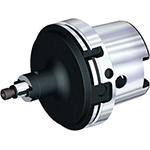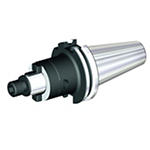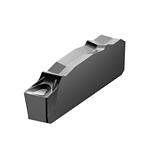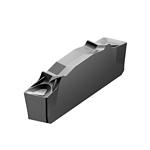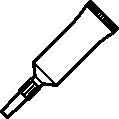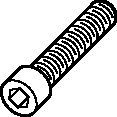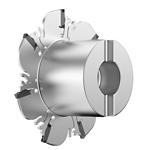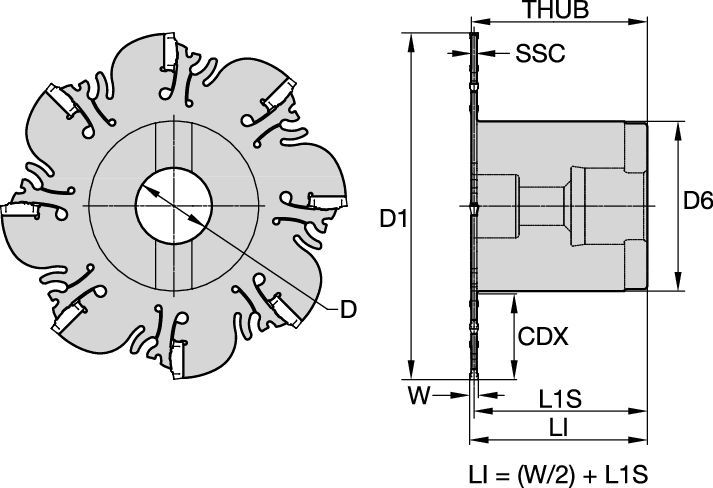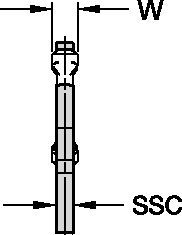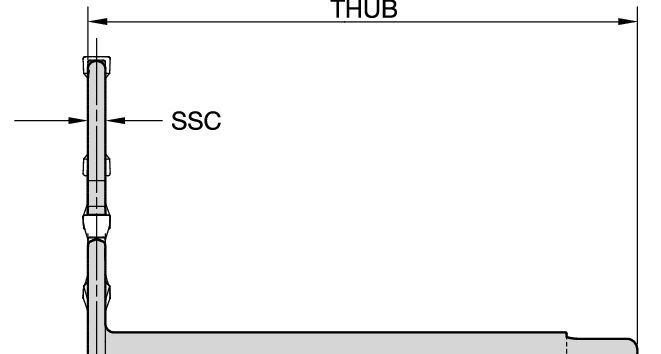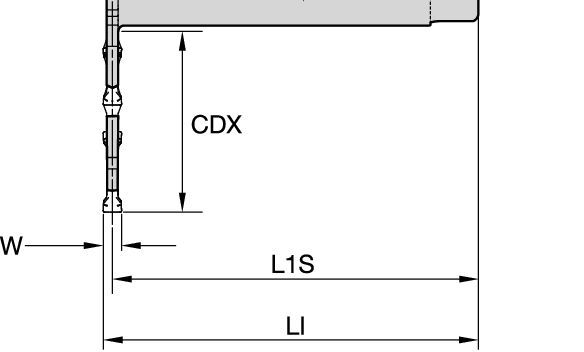Produit similaire à:
KNS® • Shell Mount • Metric
Slot milling cutter for multiple materials.
Numéro de matériel5614852
Ref. ISO CatalogueKNSM100R08X16S022Ref. ANSI CatalogueKNSM100R08X16S022
- P Acier
- M Acier inoxydable
- K Fonte
- N Non ferreux
- S Alliages hautes températures
- .caption
100055043
Rainurage : fraisage de côté
Fraisage de côté/avec épaulement : Fraisage-finition d'épaulement
Sending to {{cadTool}} in progress...
Downloaded file will be available after import in the {{cadTool}} tool library.
- Aperçu
- Données d'application
- Téléchargements
- Pièces compatibles côté machine
- Pièces compatibles côté pièce
- Pièces de rechange
| Numéro de matériel | 5614852 |
| Ref. ISO Catalogue | KNSM100R08X16S022 |
| Ref. ANSI Catalogue | KNSM100R08X16S022 |
| Taille de la plaquette [SSC] | 16 |
| [BM] Largeur de coupe minimale | 1.9 mm |
| [BM] Largeur de coupe minimale | 0.075 in |
| [BMAX] Largeur de coupe maximale | 2.5 mm |
| [BMAX] Largeur de coupe maximale | 0.198 in |
| [D1] Diamètre effectif de coupe | 100 mm |
| [D1] Diamètre effectif de coupe | 3.937 in |
| [D] Adaptateur / Queue / Diamètre d’alésage | 22 mm |
| [D] Adaptateur / Queue / Diamètre d’alésage | 0.87 in |
| [D6] Diamètre du moyeu | 49 mm |
| [D6] Diamètre du moyeu | 1.929 in |
| [CDX] Profondeur de coupe radiale maximale | 24.7 mm |
| [CDX] Profondeur de coupe radiale maximale | 0.972 in |
| [L1] Longueur de référence | 50.8 mm |
| [L1] Longueur de référence | 2.0059 in |
| [L1S] Longueur de l’étalon secondaire | 50 mm |
| [L1S] Longueur de l’étalon secondaire | 1.9685 in |
| [W1] Largeur de lame | 1.6 mm |
| [W1] Largeur de lame | 0.063 in |
| [THUB] Épaisseur du moyeu | 50.8 mm |
| [THUB] Épaisseur du moyeu | 2 in |
| Nombre de plaquettes | 8 |
| Plaquette étalon | XCP16_____ |
| Poids en kilogrammes | 0.73 |
| T/Min max | 800 |
Matériaux de pièce à usiner
- Acier
- Acier inoxydable
- Fonte
- Non ferreux
- Alliages hautes températures
- .caption
Uses and application
100055043
Rainurage : fraisage de côté
Fraisage de côté/avec épaulement : Fraisage-finition d'épaulement
Features and benefits
- The Double-V Design of the insert and the insert pocket securely holds the insert in place, minimises radial runout, providing high slot width accuracy and high repeatability.
- A unique self-clamping mechanism ensures easy insert exchange.
Créez une Solution pour calculer les avances et vitesses
Après avoir créé une Solution, choisissez simplement l'icône "Avances et Vitesses" et notre système vous fournira ses recommandations. Vous pouvez les personnaliser en ajoutant votre machine et vos spécifications techniques, ou en ajustant votre demande à l'aide des curseurs.
Feeds
Avances de départ recommandées [MM/Z]
| KNS® Slotting Cutter • Recommended Starting Feeds [mm/th] | ||||||||||||
| Géométrie de plaquette | Avance par dent de départ recommandée (Fz) en relation avec le % de l'Engagement Radial (ae) | |||||||||||
| 5% | 10% | 20% | 30–100% | |||||||||
| L | M | H | L | M | H | L | M | H | L | M | H | |
| .S..GP | 0,13 | 0,28 | 0,35 | 0,09 | 0,20 | 0,32 | 0,07 | 0,15 | 0,32 | 0,06 | 0,12 | 0,30 |
| L = Light Machining; M = Medium Machining; H = Heavy Machining NOTE: Use "Light Machining" values as starting feed rate. | ||||||||||||
| KNS® Slotting Cutter • Recommended Starting Feeds [IPT] | ||||||||||||
| Géométrie de plaquette | Avance par dent de départ recommandée (Fz) en relation avec le % de l'Engagement Radial (ae) | |||||||||||
| 5% | 10% | 20% | 30–100% | |||||||||
| L | M | H | L | M | H | L | M | H | L | M | H | |
| .S..GP | 0.005 | 0.011 | 0.027 | 0.004 | 0.008 | 0.020 | 0.003 | 0.006 | 0.015 | 0.002 | 0.005 | 0.012 |
| L = Light Machining; M = Medium Machining; H = Heavy Machining NOTE: Use "Light Machining" values as starting feed rate. | ||||||||||||
Speeds
Vitesses de départ recommandées [m/min]
| KNS® Slotting Cutter • Recommended Starting Speed [m/min] | ||||||||||
| nuance | KCU25 | KCPK30 | KMF | |||||||
| Epaisseur copeau hm mm | Mini | Maxi | Mini | Maxi | Mini | Maxi | ||||
| Groupe Matières | Maxi | Départ | Mini | Maxi | Départ | Mini | Maxi | Départ | Mini | |
| P | 1 | 260 | 230 | 215 | 455 | 395 | 370 | 295 | 260 | 245 |
| 2 | 220 | 190 | 160 | 280 | 255 | 230 | 250 | 215 | 180 | |
| 3 | 200 | 170 | 140 | 255 | 230 | 205 | 230 | 195 | 160 | |
| 4 | 180 | 150 | 120 | 225 | 185 | 160 | 205 | 170 | 135 | |
| 5 | 150 | 135 | 120 | 190 | 170 | 150 | 170 | 155 | 135 | |
| 6 | 130 | 100 | 80 | 160 | 135 | 110 | 150 | 115 | 90 | |
| M | 1 | 210 | 170 | 135 | 205 | 185 | 155 | 195 | 170 | 155 |
| 2 | 170 | 150 | 110 | 185 | 160 | 140 | 175 | 150 | 125 | |
| 3 | 130 | 120 | 85 | 145 | 130 | 115 | 130 | 115 | 90 | |
| K | 1 | 270 | 220 | 170 | 295 | 265 | 240 | – | – | – |
| 2 | 230 | 190 | 160 | 235 | 210 | 190 | – | – | – | |
| 3 | 210 | 160 | 140 | 195 | 175 | 160 | – | – | – | |
| N | 1 | – | – | – | – | – | – | – | – | – |
| 2 | – | – | – | – | – | – | – | – | – | |
| 3 | – | – | – | – | – | – | – | – | – | |
| S | 1 | 30 | 25 | 20 | – | – | – | 40 | 35 | 30 |
| 2 | 30 | 25 | 20 | – | – | – | 40 | 35 | 30 | |
| 3 | 40 | 30 | 20 | – | – | – | 50 | 40 | 30 | |
| 4 | 55 | 40 | 25 | 50 | 45 | 35 | 55 | 50 | 35 | |
| H | 1 | – | – | – | – | – | – | – | – | – |
| Recommended Starting Speed are pointing to 90° Shoulder Milling . Starting Speed for Face and Copy Milling can be Increased by 20 %. As the average chip thickness increases, speed should be decreased. Material groups P, M, K and H show recommended starting speeds for dry machining. For wet machining, reduce speed by 20%. Material groups N and S show recommended starting speeds for wet machining. Not recommended for dry machining. | ||||||||||
| KNS® Slotting Cutter • Recommended Starting Speed [SFM] | ||||||||||
| nuance | KCPK30 | KCPK30 | KMF | |||||||
| Chip Thickness hex Inch | Mini | Maxi | Mini | Maxi | Mini | Maxi | ||||
| Groupe Matières | Maxi | Départ | Mini | Maxi | Départ | Mini | Maxi | Départ | Mini | |
| P | 1 | 855 | 755 | 705 | 1495 | 1295 | 1215 | 970 | 855 | 805 |
| 2 | 720 | 625 | 525 | 920 | 835 | 755 | 820 | 705 | 590 | |
| 3 | 655 | 560 | 460 | 835 | 755 | 675 | 755 | 640 | 525 | |
| 4 | 590 | 490 | 395 | 740 | 605 | 525 | 675 | 560 | 445 | |
| 5 | 490 | 445 | 395 | 625 | 560 | 490 | 560 | 510 | 445 | |
| 6 | 425 | 330 | 260 | 525 | 445 | 360 | 490 | 375 | 295 | |
| M | 1 | 690 | 560 | 445 | 675 | 605 | 510 | 640 | 560 | 510 |
| 2 | 560 | 490 | 360 | 605 | 525 | 460 | 575 | 490 | 410 | |
| 3 | 425 | 395 | 280 | 475 | 425 | 375 | 425 | 375 | 295 | |
| K | 1 | 885 | 720 | 560 | 970 | 870 | 785 | – | – | – |
| 2 | 755 | 625 | 525 | 770 | 690 | 625 | – | – | – | |
| 3 | 690 | 525 | 460 | 640 | 575 | 525 | – | – | – | |
| N | 1 | – | – | – | – | – | – | – | – | – |
| 2 | – | – | – | – | – | – | – | – | – | |
| 3 | – | – | – | – | – | – | – | – | – | |
| S | 1 | 100 | 80 | 65 | – | – | – | 130 | 115 | 100 |
| 2 | 100 | 80 | 65 | – | – | – | 130 | 115 | 100 | |
| 3 | 130 | 100 | 65 | – | – | – | 165 | 130 | 100 | |
| 4 | 180 | 130 | 80 | 165 | 150 | 115 | 180 | 165 | 115 | |
| H | 1 | – | – | – | – | – | – | – | – | – |
| Recommended Starting Speed are pointing to 90° Shoulder Milling . Starting Speed for Face and Copy Milling can be Increased by 20 %. As the average chip thickness increases, speed should be decreased. Material groups P, M, K and H show recommended starting speeds for dry machining. For wet machining, reduce speed by 20%. Material groups N and S show recommended starting speeds for wet machining. Not recommended for dry machining. | ||||||||||
Guide de sélection des plaquettes
| KNS® Slotting Cutter • Insert Selection Guide | ||||||
| Groupe Matières | Travaux légers | Applications générales | Travaux lourds | |||
| – | (géomètrie légère) | (géomètrie solide) | ||||
| – | résistance à l’usure |  | ténacité | |||
| – | Géométrie | Nuance | Géométrie | Nuance | Géométrie | Nuance |
| P1-P2 | .S..GP | KCU25 | .S..GP | KCU25 | .S..GP | KCPM40 |
| P3-P4 | .S..GP | KCU25 | .S..GP | KCU25 | .S..GP | KCPM40 |
| P5-P6 | .S..GP | KCU25 | .S..GP | KCU25 | .S..GP | KCPM40 |
| M1-M2 | .S..GP | KCU25 | .S..GP | KCPM40 | .S..GP | KCPM40 |
| M3 | .S..GP | KCU25 | .S..GP | KCPM40 | .S..GP | KCPM40 |
| K1-K2 | .S..GP | KCU25 | .S..GP | KCPK30 | .S..GP | KCPK30 |
| K3 | .S..GP | KCU25 | .S..GP | KCPK30 | .S..GP | KCPK30 |
| N1-N2 | – | – | .S..GP | KCU25 | – | – |
| N3 | – | – | .S..GP | KCU25 | – | – |
| S1-S2 | .S..GP | KCU25 | .S..GP | KCU25 | .S..GP | KCU25 |
| S3 | .S..GP | KCU25 | .S..GP | KCU25 | .S..GP | KCU25 |
| S4 | .S..GP | KCU25 | .S..GP | KCU25 | .S..GP | KCU25 |
| H1 | – | – | – | – | – | – |
I have read and accepted the Terms & Conditions of use
CAD Drawings Models
Can’t find the file type you’re looking for?
Product data
